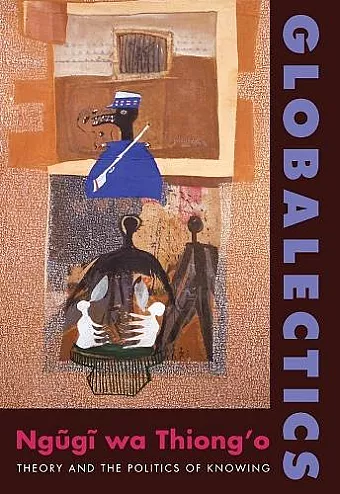Globalectics
Theory and the Politics of Knowing
Format:Hardback
Publisher:Columbia University Press
Published:21st Feb '12
Currently unavailable, and unfortunately no date known when it will be back

In this volume, Ngugi wa Thiong'o summarizes and develops a cross-section of the issues he has grappled with in his work, which uses a combination of imagery, language, folklore, and character to "decolonize the mind." He also confronts the politics of language in African writing; the problem of linguistic imperialism and literature's ability to resist it; the difficult balance between orality, or "orature," and writing, or "literature"; the tension between national and world literature; and the role of the literary curriculum in both reaffirming and undermining the dominance of the Western canon. Throughout, he engages a range of philosophers and theorists writing on power and postcolonial creativity, including Hegel, Marx, Levi-Strauss, and Aime Cesaire. Yet his explorations remain grounded in his own experiences with literature (and orature) and rework the difficult dialectics of theory into richly evocative prose.
A masterful writer working in many genres, Ngugi wa Thiong'o entered the East African literary scene in 1962 with the performance of his first major play, The Black Hermit, at the National Theatre in Uganda. In 1977 he was imprisoned after his most controversial work, Ngaahika Ndeenda (I Will Marry When I Want), produced in Nairobi, sharply criticized the injustices of Kenyan society and unequivocally championed the causes of ordinary citizens. Following his release, Ngugi decided to write only in his native Gikuyu, communicating with Kenyans in one of the many languages of their daily lives, and today he is known as one of the most outspoken intellectuals working in postcolonial theory and the global postcolonial movement. In this volume, Ngugi wa Thiong'o summarizes and develops a cross-section of the issues he has grappled with in his work, which deploys a strategy of imagery, language, folklore, and character to "decolonize the mind." Ngugi confronts the politics of language in African writing; the problem of linguistic imperialism and literature's ability to resist it; the difficult balance between orality, or "orature," and writing, or "literature"; the tension between national and world literature; and the role of the literary curriculum in both reaffirming and undermining the dominance of the Western canon. Throughout, he engages a range of philosophers and theorists writing on power and postcolonial creativity, including Hegel, Marx, Levi-Strauss, and Aime Cesaire. Yet his explorations remain grounded in his own experiences with literature (and orature) and reworks the difficult dialectics of theory into richly evocative prose.
Globalectics allows us to read world literature through Ngugi's sharp and compassionate eyes. Part memoir, part magisterial survey, and entirely engrossing, this book is a capstone to a long and brilliant career. -- Christopher L. Miller, Yale University In an ever-shrinking world, this book demonstrated the need to understand the similarities and differences in the stories we tell each other. Publishers Weekly Ngugi's writing style seamlessly blends personal narratives with complex theoretical discussions, taking the reader on a journey that combines his indisputable literary skills with an acute awareness of the theoretical landscape. -- Annika Hughes ID: International Dialogue Globalectics is an outstandingly succinct, grounded, and wide-reaching study that will be of interest, and an inspiration, to many scholars, especially those working and teaching in the fields of globalization and of postcolonial and comparative literary studies. -- Erica Lombard MODERN LANGUAGE REVIEW
ISBN: 9780231159500
Dimensions: unknown
Weight: unknown
120 pages